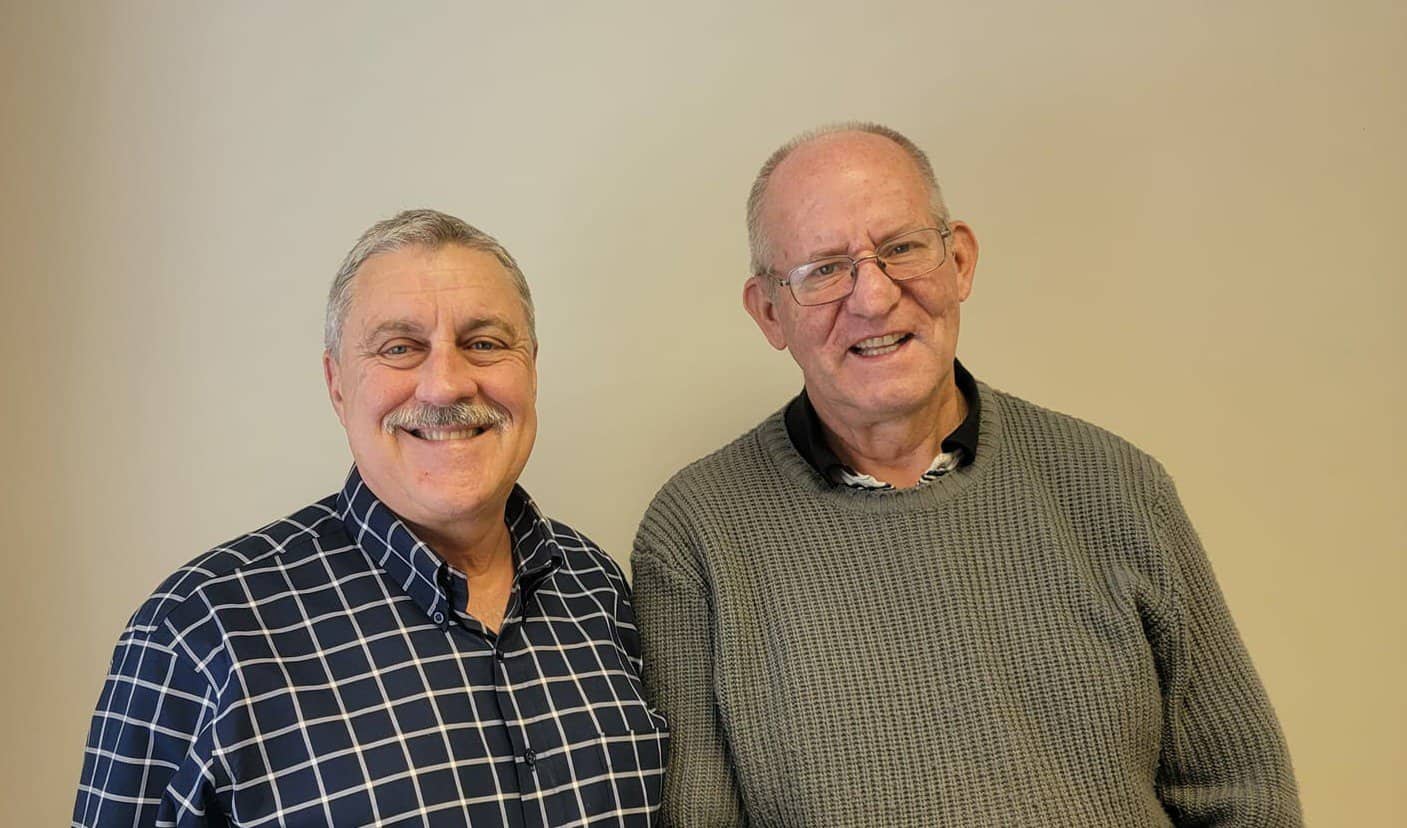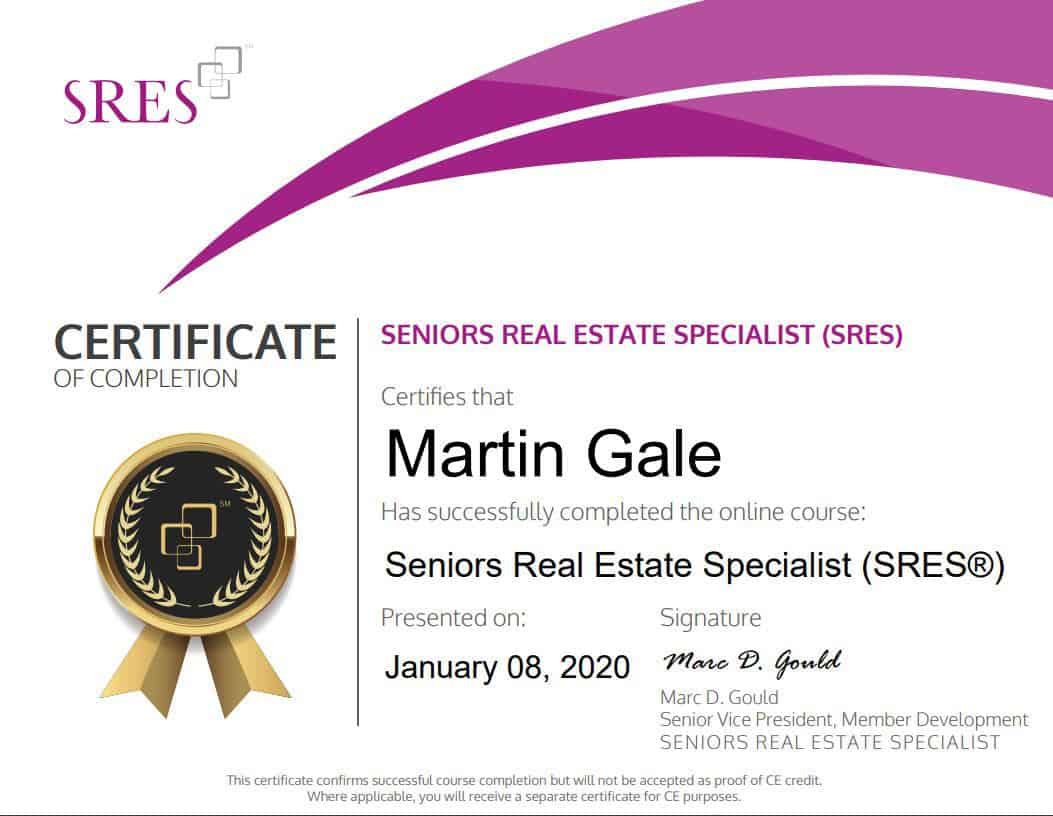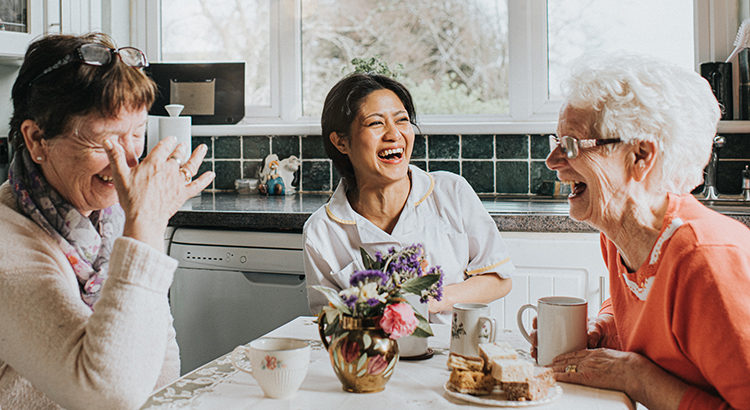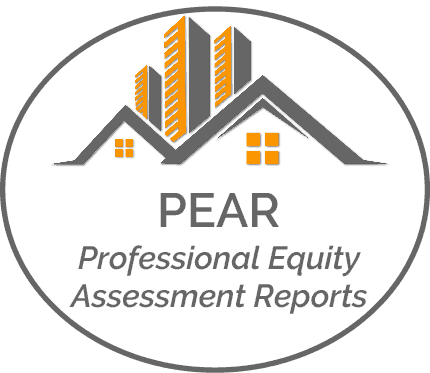Resources for Plus 50 Age Group

“Marty was very professional; I thought he always looked out for me and my interests. His advice was excellent in getting buyers to the house and he exceeded my expectations for selling my house and getting me a new house. His communication along the process was Top Notch. He always returned my calls as soon as possible — most times immediately and if he couldn’t, he would text me when he would be available to call back. I would recommend Marty Gale as a Realtor to anyone, You will not be disappointed”
How can SRES Help You Plan for Your Future Housing Needs?
Most of us put time and effort into planning for retirement. That is, we plan for money-related issues such as retirement funds. Secondly, people plan for long-term care and life insurance. Deciding on where you’ll live as you age often takes a backseat during retirement planning.
Whether you are considering aging in place, downsizing, purchasing a rental property, or even upsizing to a new location, dealing with real estate transactions and choices can be a confusing maze to negotiate, even for experienced home buyers. Beyond the complexity of real estate transactions, those over fifty are often more sophisticated shoppers and can benefit from a knowledgeable SRES representative.
Our Senior Transition Timeline
Step 1: Initial Consultation: We will set up an appointment to meet with you and your family to discuss your personal and confidential situation. An action plan will be set in place to meet your needs and start the process of moving forward.
Step 2: Getting Organized: Our Senior Move Manager will work with you as little or as much as you need. From sorting and packing the home to complete clean out.
Step 3: Taking Inventory: After it is determined what items will be taken to the new place, you have to decide what they would want to do with everything which is remaining. They could do an estate sale, they could donate it, or they could even do a complete clean out.
Step 4: Preparing the Home for Sale: Before investing any money into their house, we will let you know what items we would recommend they should do to get their home in top showing condition. If everyone decides to do so, we have a list of trusted vendors who can help with home repair, flooring, painting, and any other service which may be needed.
Step 5: Pre-MLS Marketing & Selling the Property: In order to get the most exposure of their home, we will pre-market the home to our local buyers, network of local agents, and online marketing strategies. We have a systemtic approach to selling the home quickly and for top dollar.
Senior Transitions and Real Estate
Over 3 decades we’ve helped many seniors and their families transition from the family home to their next choice of living accommodations. We understand how important and unique each situation is, how stressful and emotional it can be, and how we can help make this life changing move compassionate, comfortable, and caring.
Start the conversation early – communication is vital. The thought of leaving the family home can be overwhelming and raise lots of questions for seniors: How do we even start? What is the first step? Can we financially do this? What about all the personal belongings? The items to leave behind? Will the adult children be involved? Who can I trust? Who can help?
Marty Gale Holds the Seniors Real Estate Specialist – SRES® Designation. Seniors Real Estate Specialists receive specialized education to help those age 50+ through lifestyle transitions involving downsizing, relocation, or selling the family home.
SRES® is a REALTOR® who is uniquely qualified to assist seniors in housing sales and purchases. The SRES® designation is awarded only to REALTORS® who have additional education on how to help seniors and their families with later-in-life real estate transactions.
We all at some point and time will experience the need for additional care of a loved one.
My wife and I have been caring for my mother for quite some time. We were able to get by with Mom staying at home. Weekly help of a home assistant with laundry and cleaning, family members visiting often, and bringing in food and groceries. Lawn care and other misc items hired out. This worked but was balanced on thin ice. With motion-activated cameras in the living areas, it allowed us to monitor her in the night and morning as well as check in on live video. I’ll call that a partially effective bandage. Till last month.
Mom has a partially disabled roommate she generously let stay with her and pays no rent. Ok sort of with me. It would have been nice for her to help with utilities and such. My griping aside she is a valuable set of eyes and ears.
At 3:30 am in the morning, Mom’s roommate (across the hall from the bathroom) heard Mom cry out, “I can’t get up, I’m stuck on the toilet!” Her roommate repeatedly called me my brother, sister, and my wife till my wife woke up and answered at 5 a.m. We live nearly 30 min away so it wasn’t till 5:30 a.m. that my Wife was able to lift mom up and let her navigate to her geriatric easy chair. She was complaining of stiffness in one leg. She promptly falls asleep in the easy chair till 3:00 pm. We get a call again. Your mother can not get out of her geriatric easy chair and is complaining of severe pain. It takes us about 30 minutes to get there to attempt to help her up. This time Mom was in so much pain we had to call paramedics.
We followed her to the emergency room and stayed till 9:00 p.m. Her Troponin levels were elevated and very high.
“Your heart releases cardiac enzymes (cardiac biomarkers) when there’s heart damage or stress due to low oxygen. Troponin and creatinine phosphokinase (CPK) levels rise after a heart attack. Elevated heart enzyme levels can also indicate acute coronary syndrome or ischemia”
Mom had a severe UTI infection coupled with sepsis. Mom was hospitalized for about 10 days. At this point, she was unable to be released back to her home. A loss of 17% of heart function was diagnosed. She was transferred to a Skilled nursing center to undergo rehabilitation.
Some walking functions were improving but far from self-toileting. Then she tested positive for COVID-19, nonsystematic at first. Then for a couple of days, she was experiencing a loss of lucidity and what I would call an awake nightmare at times. She is recovering from that (Fingers Crossed).
Now come the hard choices.
What is best for Mom?
What care would be the best?
If Dad were alive, what would he do?
Going back home will not provide the care needed 24/7 (in my opinion). Skilled nursing, where she is now is rather depressing and stark. Not much like home. Level 2 or 3 assisted living for now may be the best option, that if mom is able to qualify.
I am telling you this story because I (we) are living it.
When it comes to caring for our loved ones in their golden years, it’s important to understand the different levels of care available in senior living and assisted living communities. Whether it’s choosing the right level of care for our aging parents or providing guidance to a friend or family member, navigating the options can be overwhelming. In this blog article, we will explore the various care levels for seniors, from independent living to memory care, and share essential tips on how to ensure their well-being and happiness in these environments. Join us as we delve into this important topic and learn how to provide the best care possible for those we hold dear.
Understanding The Different Assisted Living Care Levels
When it comes to senior living and taking care of our loved ones, it’s important to understand the different care levels available in assisted living facilities. Each individual has unique needs, and finding the right care level ensures that they receive the appropriate support and assistance. In this article, we will explore the various assisted living care levels to help you make an informed decision for your loved ones.
1. Independent Living:
Independent living is suitable for seniors who are still active and do not require regular assistance with daily activities. This option offers a sense of community and a range of amenities, such as recreational activities, fitness programs, and social events. Residents live in their own apartments or cottages and have access to on-site dining options. Independent living provides a safe and maintenance-free environment for seniors while promoting an active and independent lifestyle.
2. Assisted Living:
Assisted living is ideal for seniors who need some assistance with daily tasks but still want to maintain a certain level of independence. This care level offers help with activities of daily living (ADLs), including bathing, dressing, medication management, and transportation. Trained staff is available around the clock to provide support and ensure the safety and well-being of residents. Assisted living communities often provide amenities like communal dining, housekeeping, laundry services, and organized social activities.
3. Memory Care:
For those dealing with Alzheimer’s disease, dementia, or other memory-related issues, memory care is specifically designed to meet their unique needs. Memory care facilities provide a secure and structured environment where residents receive specialized care and support. Staff members are trained to handle memory-related challenges, ensuring a safe and stimulating environment for individuals with memory impairments. Memory care communities offer specialized activities, therapies, and support groups to enhance cognitive function and maintain a high quality of life.
4. Skilled Nursing Care:
Skilled nursing care, also known as nursing homes, caters to seniors with complex medical conditions or disabilities that require round-the-clock nursing care. This care level provides specialized medical services, including wound care, physical therapy, medication management, and rehabilitation services. Skilled nursing care offers a higher level of medical supervision and support for seniors who may have chronic illnesses or are recovering from surgeries or injuries.
5. Respite Care:
Respite care provides short-term stay options for seniors who require temporary assistance and support. This care level is particularly beneficial for caregivers who may need a break or have other responsibilities to attend to. Seniors can enjoy the amenities and services of the assisted living community without the long-term commitment, giving both the caregiver and the senior a chance to recharge and rejuvenate.
Choosing the right assisted living care level for your loved ones requires careful consideration of their needs, preferences, and budget. It’s important to visit potential communities, talk to the staff and residents, and ask questions to ensure that the care level aligns with your loved one’s requirements. Consulting with healthcare professionals and touring different facilities can provide valuable insights to help you make an informed decision.
In conclusion, understanding the different assisted living care levels is essential for ensuring the well-being and happiness of our loved ones. By assessing their individual needs and preferences, we can find the right care level that promotes independence, provides necessary support, and creates a sense of community. Remember, each person is unique, and the key is to find an assisted living community that caters to their specific requirements, allowing them to thrive in their senior years.
Tips For Finding The Right Senior Living Community
When it comes to finding the right senior living community for your loved ones, there are several factors to consider. It is important to be well-informed and prepared in order to make the best decision that meets their needs and preferences. Here are some essential tips to guide you through the process:
1. Determine Care Needs: Start by evaluating the care needs of your loved ones. Do they require medical assistance and round-the-clock care, or are they looking for a more independent living arrangement with minimal assistance? Understanding their specific needs will help narrow down the options available.
2. Consider Location: Location plays a crucial role in senior living community selection. You may want to choose a community that is close to family and friends, allowing your loved ones to maintain their social connections. Additionally, consider proximity to healthcare facilities, shopping centers, and recreational amenities that can enhance their quality of life.
3. Research Different Living Options: Assisted living communities offer varying levels of care and services. Research different types of senior living options such as independent living, assisted living, memory care, or skilled nursing care. Each option caters to different needs, so it’s important to choose one that is aligned with your loved one’s requirements.
4. Visit Potential Communities: Prioritize visiting potential communities in person. This will allow you to experience the atmosphere and interact with staff and residents. Pay attention to the cleanliness and maintenance of the facility, the friendliness of the staff, and the availability of amenities and activities that your loved ones might enjoy.
5. Talk to Current Residents and Their Families: Reach out to current residents and their families to gather first-hand feedback about their experiences in the senior living community. This will give you a deeper understanding of the community’s strengths and weaknesses, ensuring you can make an informed decision.
6. Consider Staff Training and Qualifications: The staff at the senior living community will be responsible for the care and well-being of your loved ones. Inquire about their qualifications, training programs, and staff-to-resident ratio. Ensure that the staff is well-equipped to handle your loved one’s specific needs.
7. Review Contracts and Costs: Carefully review the contracts provided by different communities and understand the costs involved. Consider both the upfront fees and ongoing monthly costs. Ask about any additional charges for specific services or levels of care, and ensure that you have a clear understanding of the financial commitment.
8. Assess Safety and Security: Safety and security should be a top priority in any senior living community. Inquire about the community’s emergency preparedness protocols, security measures, and accessibility features. Consider whether the community has 24-hour on-site staff and access to medical care in case of emergencies.
9. Take Preferences and Lifestyle into Account: It’s important to consider your loved one’s preferences and lifestyle when selecting a senior living community. Take into account their hobbies, interests, and social activities they enjoy. Choose a community that aligns with their lifestyle and offers opportunities for engagement and fulfillment.
10. Trust Your Gut Feeling: Last but not least, trust your instincts. While it’s important to consider all the practical aspects and gather information, sometimes your gut feeling can offer valuable insights. If something feels off or if you have any concerns, explore other options until you find the community that gives you peace of mind.
Finding the right senior living community can be a challenging process, but by following these tips, you’ll be better equipped to make an informed decision. Remember to involve your loved ones in the decision-making process as much as possible to ensure their needs and desires are met. With careful research and consideration, you can help provide your loved ones with a comfortable and fulfilling living environment in their golden years.
Assessing The Needs And Preferences Of Your Loved Ones
When it comes to making decisions about senior living and assisted care, it is crucial to assess the needs and preferences of your loved ones. Each individual has unique requirements, and understanding them is essential for ensuring they receive the appropriate level of care and support. By conducting a comprehensive assessment, you can make informed decisions and provide them with the best possible living arrangements.
1. Physical Health:
Start by evaluating the physical health of your loved ones. Consider any chronic conditions or disabilities they may have and understand how these affect their daily activities. Assess factors like mobility, medication management, and the need for assistance with tasks such as bathing, dressing, or eating. By assessing their physical health, you can determine if they require more intensive care at an assisted living facility or if they can manage with less support.
2. Cognitive Ability:
Another critical aspect to consider is the cognitive ability of your loved ones. Conditions like Alzheimer’s or dementia require specific care and support. Evaluate their memory, communication skills, and decision-making abilities. Identifying any cognitive decline will help determine if memory care or specialized services within a senior living community are necessary.
3. Emotional Well-being:
Emotional well-being plays a significant role in overall quality of life. Assess the emotional needs of your loved ones and consider their social preferences. Do they require frequent social interactions and community involvement, or do they prefer a more quiet and peaceful environment? Understanding their emotional well-being will help select a senior living facility that can provide the appropriate level of social engagement and emotional support.
4. Lifestyle and Hobbies:
Take into account the lifestyle and hobbies your loved ones enjoy. It is vital to find a living arrangement that accommodates their interests and allows them to continue engaging in activities they love. Some senior living communities offer a range of amenities and recreational programs tailored to specific hobbies, such as gardening, arts and crafts, or fitness. By considering their preferences, you can promote an active and fulfilling lifestyle for them.
5. Financial Considerations:
Discuss financial matters with your loved ones to understand their budget and how it aligns with their desired level of care. Conduct research to evaluate the costs associated with different assisted care options and determine what services are included. This information will help you make decisions that are both financially feasible and in line with their needs and preferences.
6. Involving Your Loved Ones:
It is crucial to involve your loved ones in the decision-making process. Encourage open and honest discussions about their desires, concerns, and preferences. By actively involving them, you can ensure they have a sense of ownership over the decisions being made and that their voices are heard and respected.
Remember that senior living and assisted care decisions are not one-size-fits-all. Gathering as much information as possible and assessing the needs and preferences of your loved ones will help you make well-informed choices that prioritize their well-being, happiness, and quality of life. By taking the time to assess these factors, you can ensure that your loved ones receive the care and support they need in a compassionate and nurturing environment.
Ensuring Quality Care And Nurturing Relationships
As our loved ones age, it becomes increasingly important to ensure that they receive the highest quality of care and support. Senior living communities offer various levels of assisted living care to meet the unique needs of each individual. However, finding the right level of care and nurturing relationships within these communities can be a challenging task. In this section, we will explore some effective strategies to ensure quality care and foster meaningful relationships for our loved ones.
First and foremost, it is vital to do thorough research and gather information about different senior living communities before making a decision. Each community may offer various care levels such as independent living, assisted living, memory care, or skilled nursing. Understanding the distinction between these levels allows you to choose the most appropriate care setting for your loved one’s specific needs.
Once you have selected a senior living community that aligns with your loved one’s requirements, it is crucial to establish open and honest communication with the staff members. Taking the time to build a relationship with the care team can greatly contribute to the overall well-being of your loved one. Schedule regular meetings or calls with the staff to discuss any concerns, provide feedback, or ask questions about your loved one’s care plan.
Furthermore, actively engaging in your loved one’s daily life within the senior living community can have a significant impact on their overall happiness and sense of belonging. Participating in community activities, attending special events, or simply spending quality time together can strengthen the bond between you and your loved one. By being present and involved, you can provide emotional support and ensure that your loved one feels valued and cared for.
In addition to the care provided by the senior living community, it is important to consider the emotional and social well-being of your loved one. Nurture their relationships by encouraging visits from family and friends, organizing outings or gatherings, or facilitating their participation in group activities. Maintaining these connections can enhance their overall quality of life and prevent feelings of isolation and loneliness.
Another aspect to consider in ensuring quality care and nurturing relationships is to stay informed about your loved one’s healthcare needs. This includes knowing their medical history, keeping track of doctor’s appointments, and advocating for their healthcare rights. By actively participating in their healthcare decisions, you can ensure that their medical needs are met and that their care plan is tailored to their specific requirements.
Furthermore, it is crucial to regularly assess the level of care being provided to your loved one. Keep a close eye on their physical and mental well-being, and be observant of any signs of decline or changes in behavior. If you notice any issues or have concerns about the care being provided, don’t hesitate to address them with the senior living community’s management or care team. Communication and feedback play a vital role in ensuring that your loved one receives the care they deserve.
Ultimately, ensuring quality care and nurturing relationships for our loved ones in senior living communities requires active involvement, open communication, and a genuine commitment to their well-being. By taking the time to understand the care levels available, building relationships with the staff, actively participating in your loved one’s life, maintaining social connections, advocating for their healthcare needs, and regularly assessing the care being provided, you can help create a safe and nurturing environment that promotes their happiness and overall quality of life.
More of what you LIVE for.
Find your ideal home with my help. I’m your SRES®.
Every transition is an opportunity, regardless of your stage in life. With the right preparation, a new home can provide the fresh start and continual enjoyment you’ve been working toward.
By partnering with an SRES® like me during your new home search, you’ll gain the help and expertise of a REALTOR® specialized in meeting the needs of home buyers and sellers ages 50+.
I have both the education and real estate experience to serve as your trusted advisor through the unique financial and lifestyle transitions involved in relocating or selling your family home.
What is an SRES®?
A Seniors Real Estate Specialist® (SRES®) is a real estate agent who is uniquely qualified to assist home buyers and sellers ages 50+. The SRES® designation is awarded only to real estate agents who have additional education on how to help seniors and their families with later-in-life real estate transactions.
SRES® designees also draw upon the expertise of a network of specialists, such as estate planners, CPAs, and eldercare lawyers, and are familiar with local community resources and services. Their mission is to help seniors and their families navigate the maze of financial, legal and emotional issues that accompany the sale of the home and assist Boomers in relocating to the home of their future.
What qualities make an SRES® different?
• Has knowledge, experience and compassion in dealing with 50+ issues.
• Can suggest housing alternatives, including ones that may allow an aging parent to remain in the home instead of selling it.
• Takes a no-pressure approach to the transaction and has a strong service orientation.
• Will take the time needed to make a client feel comfortable with the complex selling process.
• Understands the emotional demands a sale can make on a 50+ client, and tries to minimize them.
• Can interact easily with all generations, including adult children and caretakers.
• Is knowledgeable in senior housing options from active adult communities to assisted living.
• Has a wide network of other senior-focused professionals who can assist in tax counseling, financial and estate planning, and other aspects of the sale and move.
Common Questions Seniors (Plus 50) Ask Us
-
Is this an interim or transitional move?
-
How does this purchase fit into future plans?
-
Is it a second home that may become a primary home in the future?
-
A transition home to be sold at retirement?
-
How do you feel about making this move?
-
What are the top ten things you want, or never want, in a home?
-
Are there special needs or property features to consider?
-
Will the neighborhood meet your needs for transportation, grocery delivery, meals, and medical?
-
Do you do your own housekeeping and gardening?
-
What form of communication do you prefer?
-
Phone? email?
-
Is there another family member involved in the decision?
-
Would you like to know more about the financial options available?
-
Do you currently have a reverse mortgage?
-
Will the move impact long-term health care coverage?
-
In the case of an estate, has the estate been probated?
What qualities make an SRES® different?
- Has knowledge, experience and compassion in dealing with senior issues.
- Can suggest housing alternatives, including ones that may allow an aging parent to remain in the home instead of selling it.
- Takes a no-pressure approach to the transaction and has a strong service orientation.
- Understands the emotional demands a sale can make on a senior, and tries to minimize them.
- Tailors the marketing of a home to the needs of an older client.
- Can interact easily with all generations, including seniors, adult children
and caretakers.

Senior Communities

How Homeowners Win When They Downsize
How Homeowners Win When They Downsize Downsizing has long been a popular option when homeowners reach retirement age. But there are plenty of other life changes that could make downsizing worthwhile. Homeowners who have experienced a change in their lives or no longer...

Why Use A Senior Real Estate Specialist?
Why Use A Senior Real Estate Specialist As we age, our housing needs change. Whether you're looking to downsize, move closer to family, or find a home that better suits your lifestyle, the process of selling your home can be overwhelming. That's where a Senior...

Falling out of Love with Your House? It May Be Time To Move.
Falling out of Love with Your House? It May Be Time To Move. Owning a home means having a place that’s solely your own and provides the space, features, and location you and your loved ones need. But what happens when your needs change? If this hits home for you, it...

Could a Multigenerational Home Be the Right Fit for You?
Could a Multigenerational Home Be the Right Fit for You? During the pandemic, many of us reexamined the meaning of home for ourselves and our loved ones. Today, that can be seen in the recent rise in multigenerational households. According to Jessica Lautz, Deputy...

Planning to Retire? It Could Be Time To Make a Move
Planning to Retire? It Could Be Time To Make a Move. If you’re thinking about retirement or have already retired this year, you may be planning your next steps. One of your goals could be selling your house and finding a home that more closely fits your needs....

Don’t Sell on Your Own Just Because It’s a Sellers’ Market
Don’t Sell on Your Own Just Because It’s a Sellers’ MarketIn a sellers’ market, some homeowners might be tempted to try to sell their house on their own (known as For Sale By Owner, or FSBO) instead of working with a trusted real estate professional. When the...

10 Questions to Ask an Elder Law Attorney
10 Questions to Ask an Elder Law Attorney Elder law attorneys cover a wide variety of legal areas, potentially including guardianship, long-term care planning, knowledge of government benefit programs, powers of attorney, estate planning, advance medical directives,...

Pandemic Mortgage Relief
Clients who are struggling financially because of the pandemic may look to you for advice if they can’t pay their mortgage.Keep up on mortgage relief options, so you’re prepared to guide them to appropriate resources.For instance, thanks to the Coronavirus Aid,...

#1 Financial Benefit of Homeownership: Family Wealth
#1 Financial Benefit of Homeownership: Family WealthWhile growing up, we were taught by our parents and grandparents that owning a home is a financially savvy move. They explained how a mortgage is like a “forced savings plan.” When you pay rent, that money is lost...

Will the Utah Housing Market Turn Around This Year?
Will the Housing Market Turn Around This Year?Today, many people are asking themselves if they should buy or sell a home in 2020. Some have shifted their plans or put them on hold over the past couple of months, and understandably so. Everyone seems to be wondering if...



Free Booklet
Senior Plus 50 Resources and Web Sites
- Aging in Place Technology Watch
- American Society on Aging
- Eldercare Locator
- HelpGuide.org
- Leading Age
- National Association of Senior Move Managers
- HUD FHA Reverse Mortgage for Seniors (HECM)
http://portal.hud.gov - National Council on Aging (NCOA)
www.ncoa.org - National Resource Center on Supportive Housing and Home Modification
www.homemods.org - National Reverse Mortgage Lenders Association
www.reversemortgage.org - National Senior Citizens Law Center
www.nsclc.org - Neighbor Works Center for Homeownership Education and Counseling (NCHEC)
www.nw.org/nchec - Retired Brains
www.RetiredBrains.com - Reverse Mortgage Advisor
www.reversemortgageadvisor.com - Reverse Mortgage Guides—Education
http://reversemortgage.org - Security 1 Lending
www.s1l.com - Seniors Real Estate Specialist Consumer Web site
- Senior List
www.theseniorlist.com - Silver Planet
www.silverplanet.com - U.S. Department of Health and Human Services, Administration on Aging
www.aoa.gov
Magazines
Research
- Beyond 50.05, A Report to the Nation on Livable Communities
AARP Public Policy Institute, www.aarp.org - Growing Older in America: The Health and Retirement Study
National Institute on Aging, U.S. Department of Health and Human Services. www.nia.nih.gov - Work and Retirement Patterns for the G.I. Generation, Silent Generation, and Early Boomers: Thirty Years of Change
Urban Institute, www.urban.org - Older Americans, Continuing Care Retirement Communities Can Provide Benefits, but Not Without Some Risk
Report to the Chairman, Special Committee on Aging, U.S. Senate, GAO-10-611June 2010, www.gao.gov - The NRMLA Guide to Aging in Place
Publications, www.nrmla.org - Older Adults and Social Media
Pew Internet & American Life Project www.pewinternet.org - Older Americans 2010 Key Indicators of Well-Being
Federal Interagency Forum on Aging-Related Statistics, www.agingstats.gov
MetLife Mature Marketing Institute Research Studies
- 2009 MetLife Market Survey of Nursing Home, Assisted Living, Adult Day Services, and Home Care Costs
- Aging in Place 2.0: Rethinking Solutions to the Home Care Challenge
- Boomers: The Next 20 Years, Ecologies of Risk
- Changing Attitudes, Changing Motives: The MetLife Study of How Aging Homeowners Use Reverse Mortgages
- Encore Career Survey
- Engaging the 21st Century Multi-Generational Workforce
- Housing Trends Update for the 55+ Market (2011)
- Livable Community Indicators for Sustainable Aging in Place
- Meaning Really Matters: The MetLife Study on How Purpose is Recession-Proof and Age-Proof
Books
-
- From Age-ing to Sage-ing
Rabbi Zalman Schachter-Shalomi - The Art of Aging: Celebrating the Authentic Aging Self
Alice & Richard Matzkin - The Fountain of Age
Betty Friedan - Healthy Aging: A Lifelong Guide to Your Physical and Spiritual Well-Being
Andrew Weil - How to Care for Aging Parents
Virginia Morris and Robert M. Butler - Loving Senior Transitions: The Top Five Questions Baby Boomers Need to Ask to Help Aging Loved Ones
Ruth Fennell - The Longevity Revolution
Dr. Robert Butler - Look Me in the Eye
Cynthia Rich and Barbara MacDonald - September Songs: The Good News About Marriage in Later Years
Maggie Scarf
- From Age-ing to Sage-ing
- Moving In the Right Direction: the Senior’s Guide to Moving and Downsizing
Bruce Nemovitz - Moving On: A Guide to Housing-Related Resources Tailored to Seniors and Their Families
SRES® Council
- Seven Strategies for Positive Aging
Robert D. Hill - Still Here: Embracing Aging, Changing, and Dying
Ram Dass

